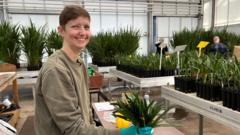Can New Lab Transform Deserts into Lush Date Groves?

Published: 2025-10-23 06:00:17 | Category: technology
Plant scientists at Date Palm Developments (DPD) in Somerset are pioneering an innovative approach to combat desertification in India by establishing a state-of-the-art lab to cultivate date palms. This initiative aims to transform the arid Thar Desert into a greener landscape while providing employment opportunities in the region. The company, which currently exports over 300,000 date plants annually to 30 countries, has partnered with India's Atul Ltd, which has invested £11 million into DPD to enhance production capabilities and support environmental reclamation.
Last updated: 09 October 2023 (BST)
What’s happening now
Date Palm Developments (DPD) is at the forefront of a revolutionary project aimed at greening the Thar Desert in northern India through the cultivation of date palms. With the recent opening of their advanced laboratory in Somerset, the firm is set to increase its production of disease-free date plants, which will be crucial for the success of this environmental initiative. The partnership with Atul Ltd signifies a strategic investment in both technology and sustainability, showcasing how UK innovation can positively impact global environmental issues.
Key takeaways
- DPD exports over 300,000 date plants annually to 30 countries.
- Atul Ltd has invested £11 million into DPD to enhance lab capabilities.
- The project aims to combat desertification in India’s Thar Desert.
Timeline: how we got here
The journey of Date Palm Developments has evolved significantly over the years. Below is a brief timeline highlighting key milestones:
- 1947: Atul Ltd is founded in India, marking the beginning of its agricultural ventures.
- 2013: DPD starts its operations in Somerset, focusing on the propagation of date palms.
- 2023: DPD opens a new state-of-the-art lab, further enhancing its production capabilities.
- 2023: Atul Ltd invests £11 million into DPD to support the project aimed at greening the Thar Desert.
What’s new vs what’s known
New today/this week
The recent opening of DPD's advanced laboratory is a significant development, as it will allow for the mass production of disease-free date palms, which are essential for the project in India. This facility employs cutting-edge technology to ensure optimal growth conditions and high-quality plants.
What was already established
DPD has been successfully exporting date plants globally for several years, with a reputation for producing high-quality, disease-free specimens. The partnership with Atul Ltd has been in place for over a decade, building trust and reliability in their collaboration.
Impact for the UK
Consumers and households
The success of DPD is significant for the UK horticultural sector. The innovative methods used in the lab may influence how other plant species are cultivated, potentially enhancing the UK’s agricultural diversity. Additionally, increased exports can contribute positively to the UK economy.
Businesses and jobs
DPD's expansion is likely to create more jobs in Somerset, as the demand for date palms grows internationally. The collaboration with Atul Ltd may also inspire other UK firms to explore similar partnerships, fostering further innovation in the agricultural sector.
Policy and regulation
As DPD expands its operations, it will need to navigate various agricultural regulations both in the UK and India. This includes compliance with biosecurity measures to ensure that the plants exported are free from pests and diseases, which is crucial for maintaining their high standards.
Numbers that matter
- 300,000: The number of date plants exported annually by DPD.
- 11 million: The investment made by Atul Ltd into DPD over the past decade.
- 30: The number of countries that import date plants from DPD.
- 18°C: The precise temperature maintained in DPD's lab for optimal growth.
- 60: The number of employees working at DPD.
Definitions and jargon buster
- Desertification: The process by which fertile land becomes desert, typically as a result of drought, deforestation, or inappropriate agriculture.
- Tissue culture: A technique used to propagate plants by growing them in a controlled environment from small plant pieces.
- Biosecurity: Measures taken to prevent the introduction and spread of harmful organisms, ensuring that plants remain disease-free.
How to think about the next steps
Near term (0–4 weeks)
In the coming weeks, DPD will focus on ramping up production in its new lab, optimising growth conditions, and preparing for the first shipments of date palms to India.
Medium term (1–6 months)
Over the next few months, the company will likely assess the growth of its initial plant batches and will begin collaborating closely with Atul Ltd to plan the logistics of planting in the Thar Desert.
Signals to watch
- Growth rates and health of the date palms produced in the lab.
- Feedback from Atul Ltd regarding the initial plantings in India.
- Regulatory developments related to plant export laws in the UK and India.
Practical guidance
Do
- Monitor the growth conditions in the lab to ensure optimal plant health.
- Engage with local agricultural bodies for insights on best practices.
Don’t
- Neglect pest and disease management protocols in the lab.
- Overlook the importance of community engagement in the planting process in India.
Checklist
- Ensure the lab environment remains sterile and controlled.
- Track plant growth regularly and adjust conditions as needed.
- Prepare packaging and logistics for shipments to India.
- Collaborate with Atul Ltd to finalise planting strategies.
- Engage with stakeholders to share progress and gather feedback.
Risks, caveats, and uncertainties
While DPD's initiative presents a promising opportunity for environmental restoration, there are inherent risks involved. The success of the date palms in the Thar Desert depends on various factors, including climate conditions, soil health, and the establishment of a supportive ecosystem. Additionally, the long-term sustainability of such projects requires ongoing investment and commitment from both DPD and Atul Ltd.
Bottom line
The collaboration between Date Palm Developments and Atul Ltd represents a significant step towards combating desertification in India. By leveraging advanced agricultural technology, DPD aims to not only produce high-quality date palms but also create a sustainable environment for future generations. This initiative serves as a model for how UK innovation can contribute to global challenges.
FAQs
What is Date Palm Developments (DPD)?
Date Palm Developments (DPD) is a Somerset-based company specialising in the cultivation and export of date palms, utilising advanced tissue culture techniques to produce disease-free plants.
How does DPD plan to help combat desertification?
DPD aims to combat desertification by producing date palms to be planted in the Thar Desert, which will help reclaim the land and create an ecosystem that can support agriculture and employment.
What is tissue culture in plant propagation?
Tissue culture is a method of growing plants from small pieces of tissue in a controlled environment, allowing for the production of large numbers of identical, disease-free plants.



